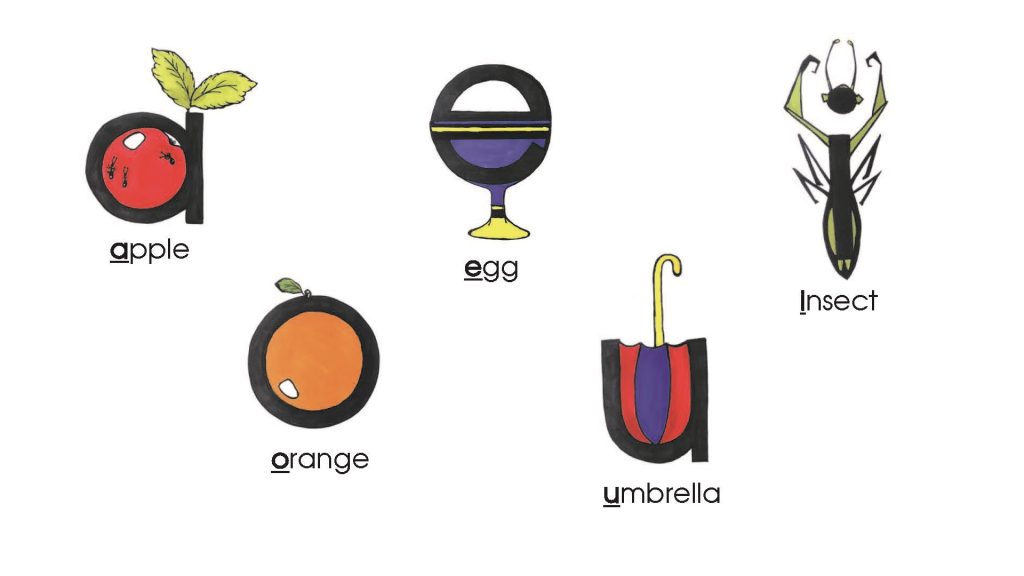
From a linguistic perspective, using the terms short and long vowel sounds in modern English is not strictly correct as the vowels are not actually short and long versions of the same sound. However, it is useful terminology when teaching beginning and struggling readers and writers. It assists in choosing the correct pronunciation of the vowel when reading words and the correct spelling of words as many spelling rules are based on being able to determine if a vowel contains a ‘short’ vowel sound.
We consider a short vowel sound as one that is pronounced briefly as opposed to a long vowel sound which has an extended duration. The short vowel sounds are the sounds of the letters:
- ‘a’ (/a/-apple)
- ‘e’ (/e/-egg)
- ‘i’ (/i/-insect)
- ‘o’ (/o/-orange)
- ‘u’ (/u/-umbrella).

Keep in mind that there are regional variations to these pronunciations.
Once students know the letters representing these vowel sounds plus the consonant sounds represented by the other letters in the alphabet, there are hundreds of words that they can read and spell.
Some of the vowel letters can also represent other short vowel sounds. For example:
- ‘a’ can represent /o/ like in ‘watch’, /e/ like in ‘many’, /i/ like in package
- ‘e’ can represent /i/ like in England
- ‘u’ can represent /o/ like in adult, /e/ like in bury
- ‘o’ can represent /i/ like in ‘women’
- ‘y’ can also be used to represent the short vowel sound /i/ like in ‘pyramid’
- etc.
However, the difficulty for new and struggling learners is that each of the vowel letters can also be used to represent long vowel sounds. Usually, this is the same as the name of the letter ‘a’ (table), ‘e’ (me), ‘i’ (child), ‘o’ (go), ‘u’ (Ruth, music). In addition, these vowel letters can represent other long vowel sounds. For example, ‘a’ can represent /or/ like in ‘ball’ and /ar/ like in ‘bath’, ‘i’ can represent /ee/ like in ‘casino, and ‘o’ can represent /ue/ like in ‘do’, etc.
Most commonly a vowel letter is pronounced as a short vowel sound in one syllable words when it is followed by at least one consonant (at, but, mist, sped) or a consonant cluster representing one sound (e.g., fish).
In multisyllable words, a vowel letter is most commonly pronounced as a short vowel sound when it is followed by a double consonant (e.g., hopping) or at least two consonant sounds (e.g., blister). However, when a vowel letter is followed by just one consonant it can be pronounced as either a long (e.g., hoping) or a short vowel sound (e.g., enemy).
This is where a knowledge of morphology and spelling rules (and to some extent etymology) comes in useful. If we know the prefixes ‘dis’, ‘ad’ and ‘un’, then we will know that the first vowel letter in the following words will be pronounced as a short vowel sound even though they are followed by one consonant – disappear, adapt, unearth.
If we know the prefixes ‘re’, ‘di’ and ‘pro’, then we will know that the first vowel letter in the following words will be pronounced as a long vowel sound even though they are followed by two consonants – retreat, digraph, protractor.
If we can identify that ‘hope’ is the base word in ‘hoping’, we can then apply the rule: ‘e’ goes away when adding a suffix beginning with a vowel. This will ensure we spell the word with only one ‘p’.
Similarly, in the word ‘hopping’, we can identify the base word ‘hop’ and then apply the rule: Double the consonant to keep the vowel short when adding a suffix beginning with a vowel.
There is one more difficulty. Some words containing two consecutive vowel letters are pronounced as a short vowel sound because only one of the vowel letters is pronounced (e.g., head, build, friend). In many words, this has occurred because the words used to be pronounced as a long vowel sound. For example, ‘head’ was pronounced /heed/ and ‘friend’ was pronounced /freend/ (similar to how we still pronounce ‘fiend’). There are also examples of vowel digraphs being pronounced as a short vowel sound (e.g., ‘said’ and ‘flood’). Again, often these words were pronounced differently. For example, the ‘ai’ in ‘said’ was pronounced the same as in ‘rain’ and the ‘oo’ in ‘flood’ was pronounced the same as it is in ‘book’.
This means that an important part of teaching reading and spelling is teaching students the short vowel sounds!
